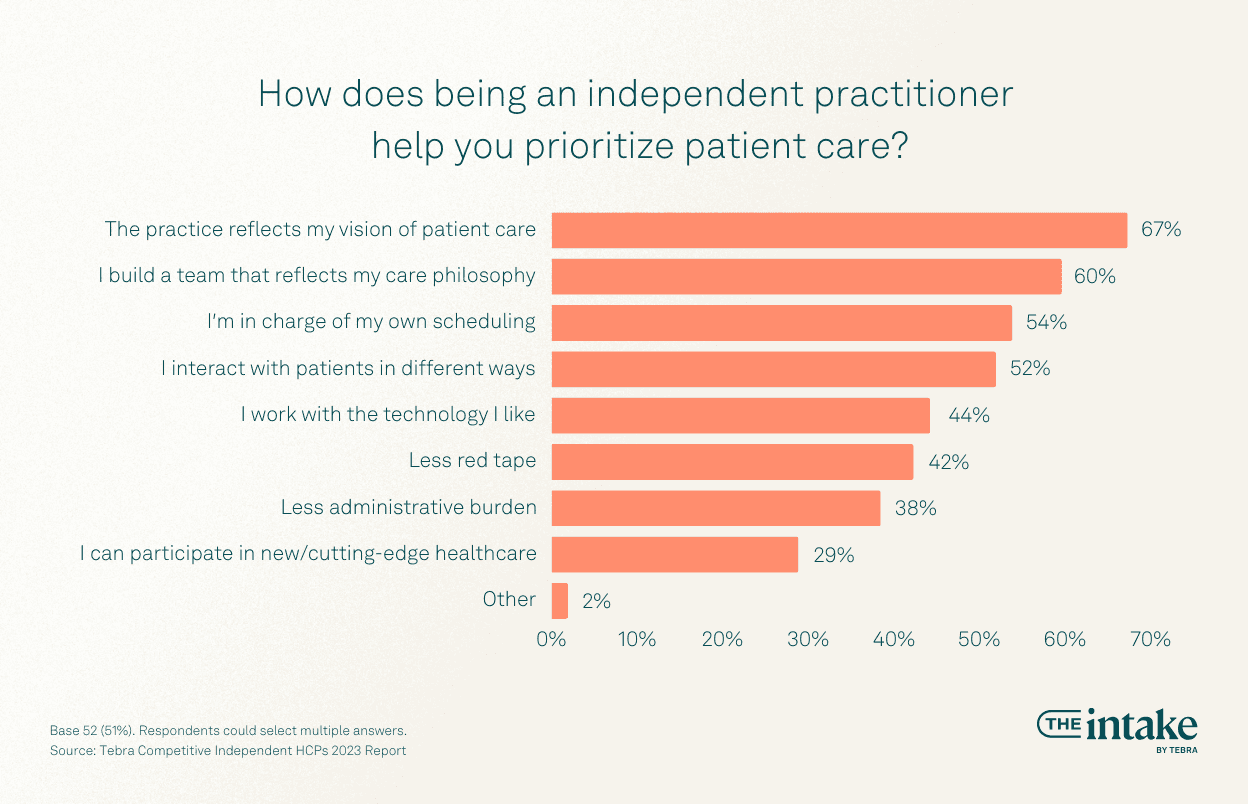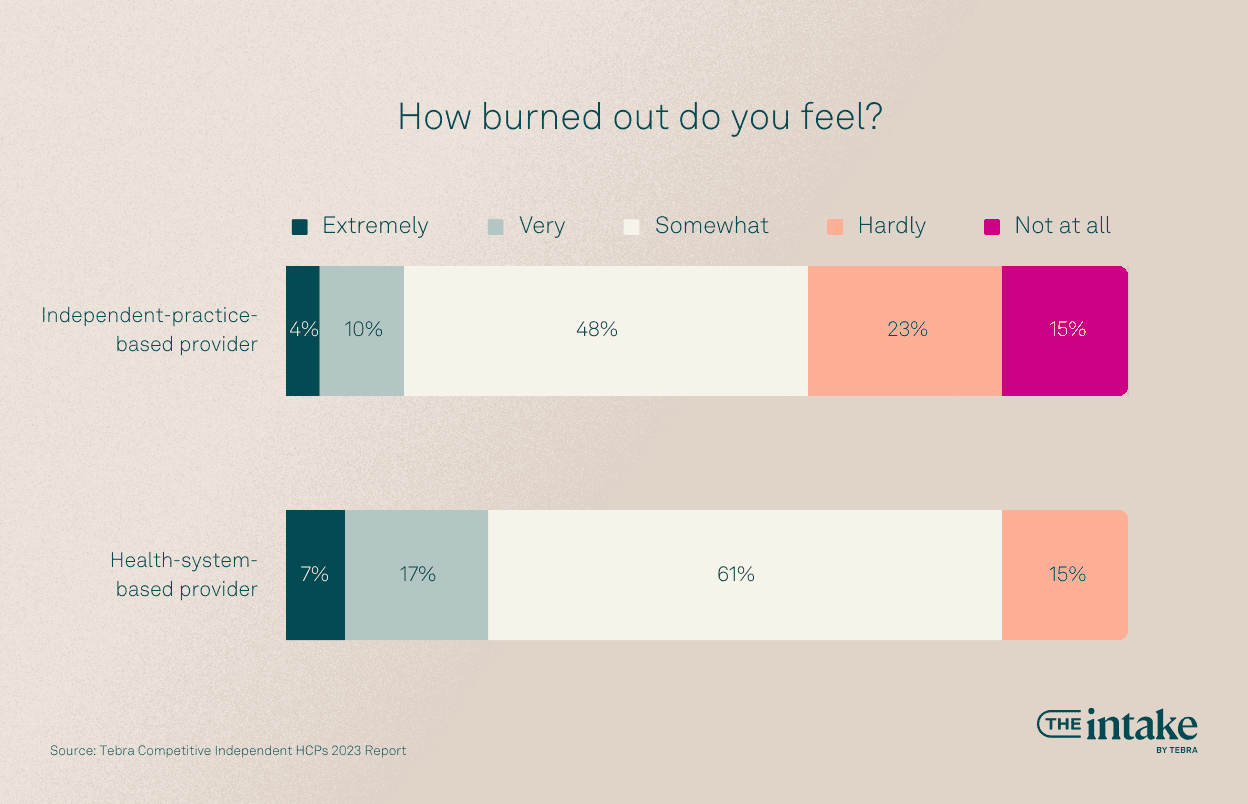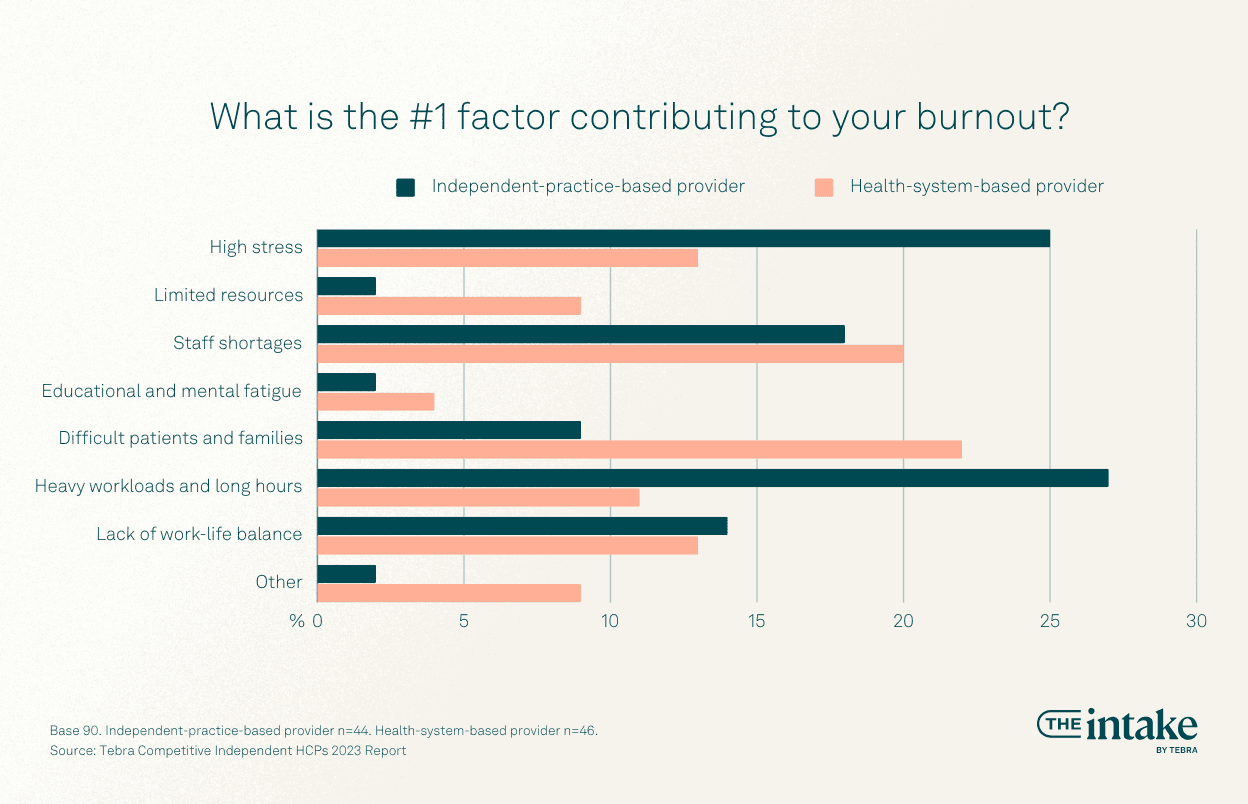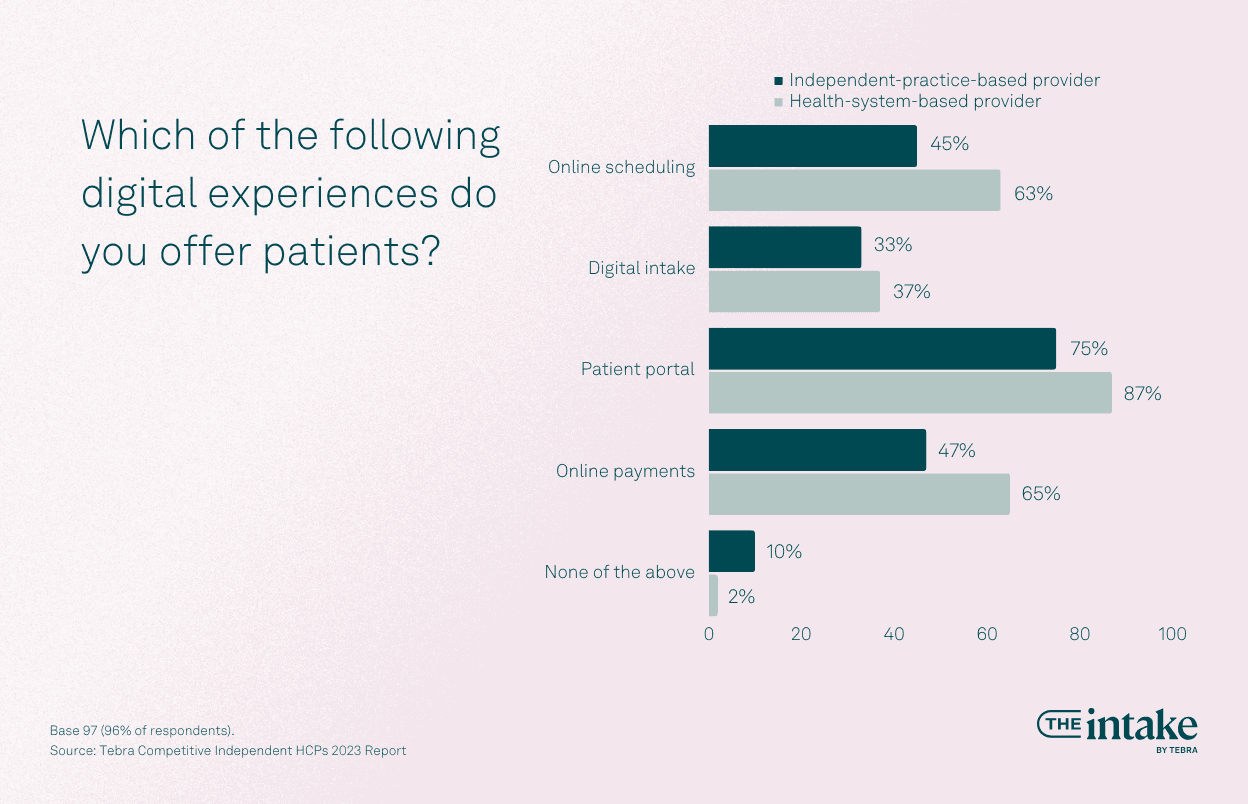Overview
- Independent healthcare providers value practice autonomy and patient-focused care, leading to less burnout and stronger patient-provider relationships compared to those in corporate health systems.
- Health system-based providers face higher stress, staffing challenges, and burnout, with many expressing interest in switching to private practice for better work-life balance and patient care control.
- Despite the advantages of independent practices, health system-based providers do lead in offering digital experiences, suggesting a need for independent providers to enhance their digital services for better patient care.
Each year, an increasing number of physicians leave independent practice for the financial stability offered by health systems.
However, according to a recent Tebra survey on how independent healthcare providers can compete with corporate- and health system-based providers, independent providers place a high premium on their practice autonomy. Their unique approach to patient care not only mitigates burnout but also cultivates deeper connections with patients, contributing to a more favorable work-life balance.
Unlike their counterparts in larger corporate or public health systems, independent practices prioritize personalized care. Doctors and clinicians spend more time with individual patients in order to truly understand their needs.
While corporate health systems, public health systems, and independent practices all have their challenges — like managing cash flow, hiring the right people, and finding some semblance of work-life balance — Tebra wanted to better understand the benefits and drawbacks of each practice type. Tebra believes healthcare facilities can learn from one another to improve their business activities and deliver a superior patient experience.
To understand how independent practice providers compare and compete with providers in health systems (including hospitals and academic institutions) and corporate-based providers (including One Medical and CVS Health), Tebra surveyed 101 US-based healthcare providers, including nurse practitioners, physicians, and specialists who provide care directly to patients.
Here are some key findings from Tebra's 2023 Independent Healthcare vs. Corporate and Health System-Based Providers Survey:
- 94% of independent providers surveyed feel confident they could deliver a superior patient experience at an independent healthcare practice.
- 37% of health-system-based providers surveyed would switch to an independent practice.
- The top 3 motivational factors listed by health-system providers interested in switching to a private practice model included a better work-life balance, more control over the work environment and patient intake, and the opportunity to develop deeper relationships with their patients.
- 88% of respondents would not work for a corporate-based provider.
The patient-provider relationship
The patient experience starts long before a prospective patient shows up for their appointment. Each step — from online research to scheduling to location — factors into a patient’s first impression and affects the likelihood of a long-term relationship.
According to respondents, these are the top factors that contribute to a strong patient-provider relationship, in order of importance:
- Strong communication (21%)
- Active listening (23%)
- Trustworthiness (18%)
- Empathy (17%)
- Shared decision-making (8%)
- Credibility (14%)
The survey also found that independent practitioners feel better able to prioritize patient care due to a flexible work environment. They can therefore manage the day-to-day aspects of their own careers and patient interactions. They can execute their vision of what patient care should be.

By having a say in which patients they take on, private practice respondents suggest that they are better able to focus on elements of patient care that contribute to a strong patient-provider relationship, like good communication and active listening.
Burnout on the rise
Physician burnout is on the rise. This phenomenon is rapidly developing into a public health crisis with adverse effects on practitioners as well as their patients, organizations, and systems.
Yet across the board, independent providers are experiencing less burnout than health-system providers. 15% of independent providers Tebra surveyed said they are not at all burned out, while 100% of health-system-based providers reported varying degrees of burnout.

Looking back at some numbers from Tebra’s survey on the impact of private equity firms on private practices, the challenges that private practice providers and those working in a hospital system face tend to differ.
The top challenges of working in a hospital system are:
- High levels of stress and burnout (45%)
- Limited resources and staff shortages (41%)
- Emotional and mental fatigue (40%)
- Difficult patients and families (37%)
- Heavy workloads and long hours (36%)
The top challenges of working in private practice are:
- Difficult patients and families (42%)
- High levels of stress and burnout (37%)
- Emotional and mental fatigue (30%)
- Heavy workloads and long hours (29%)
- Lack of work-life balance (25%)
Health-system-based healthcare providers tend to face more staffing challenges than independent providers.
Factors contributing to provider burnout
It's evident that health system-based providers feel increased stress due to staffing shortages and managing difficult patients and their families compared to their independent practice counterparts. There is also a considerable discrepancy between the effects that difficult patients have on those working in hospital systems versus those in independent practice.
It is therefore unsurprising that the top factors respondents said would motivate them to switch to private practice are more control over their work-life balance and greater control over who is accepted as a patient.

Providing a digital-first experience
Tebra’s findings indicate that independent providers spend more time on search engine optimization (SEO) and reputation management.
However, health systems-based providers are still ahead in terms of implementing new technologies. They also offer digital experiences, including online scheduling, digital intake, text reminders, online payments, and patient portals.
Independent providers can improve the patient experience by offering more digital services and learning about how technology empowers patient care.

Drive better patient outcomes
Healthcare professionals are motivated by a desire to help others, but their work environment influences the care they can deliver.
Private practices tend to be more conducive to work conditions that benefit providers and patients, reducing burnout and improving patient experiences.
Methodology
Tebra surveyed 101 US-based healthcare providers, including nurse practitioners, physicians, and specialists. Of respondents, 51% were in independent practice, 46% worked in health systems like hospitals or universities, and 3% were corporate-based. 100% of respondents provided care directly to patients. The top 3 specialties respondents practiced were pediatrics, primary care, and mental health.
About Tebra
Tebra’s mission is to unlock better healthcare for every patient by supporting practitioners in the development of their private practices. By developing a single operating system that forms the foundation of a private practice, Tebra’s platform enables physicians to thrive.
Fair use statement
Tebra grants permission to use these copyrighted materials under the provisions of fair use for non-commercial purposes. Tebra appreciates the proper attribution and citation of our copyrighted materials and asks for due credit in the form of a link back to this page.
You might also be interested in
How patients find and pick their doctors. We surveyed more than 1,300 patients nationwide to understand factors that influence how they choose a doctor and why they keep coming back. Download the free report.





